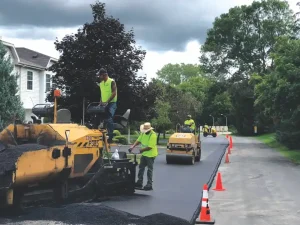Stormwater management has long been a complex issue in the construction of pavements, especially in urban settings. The expansion of cities has seen the growth of impervious paving. These surfaces don’t allow water to infiltrate the ground, resulting in excess stormwater runoff that can adversely affect the surrounding ecosystem.
Since its emergence, porous asphalt has widely been considered an innovative paving solution for stormwater control. It is a sustainable alternative to traditional impervious surfaces.
Continue reading to learn more about porous asphalt and its benefits.
Porous Asphalt
Porous asphalt is a permeable paving technique that lets stormwater infiltrate the ground. It accomplishes this by either allowing stormwater to pass through the surface, into the sub-base, and permeate into the ground or find its way to a drainage system. A porous asphalt pavement is designed with a higher-than-normal percentage of air voids to create a porous system for quality water treatment.
This permeable paving system consists of a porous asphalt course, top filter course, reservoir course, and subgrade material as the fundamental components. The rationale behind the design is to provide stormwater with a place to go by draining through the porous asphalt and percolating into the soil.
Effectiveness
The purpose of permeable pavement, as so far established, is to ensure proper stormwater control. The extent to which it fulfills this goal depends on several factors, including quality of asphalt, design, amount of rain, and soil type. Nonetheless, porous asphalt reduces stormwater volume by up to 80% of annual rainfall. It can completely dewater a surface within 72 hours of heavy rain.
Benefits
The benefits of porous asphalt as an alternative to traditional stormwater management systems are tremendous. The advantages are extensive and go beyond just reducing stormwater runoffs. They include:
- Flood prevention and control
- Minimize erosion
- Allow for recharge of groundwater and acquirers
- Extend pavement lifespan
- Enhance site landscaping benefits
- Save on the cost of stormwater management infrastructure
- Promote water quality treatment
Applicability
Permeable paving is excellent in dense urban areas where no additional land or water drainage systems are required for stormwater control. But it is only suitable for certain types of pavements. Porous asphalt paving is recommended for pedestrian-only pavements—for example, residential driveways, parking stalls, overflow parking areas, bike paths, patios, parking stalls, alleys, and walkaways.
Porous asphalt paving is, unfortunately, not ideal for heavy traffic or high-speed areas with potential pollutant loads, such as highways. The reason for this is that porous asphalt has low load-bearing capacity. Also, due to heavy pavement use, stormwater cannot appropriately be treated before infiltration.
Get Help with Porous Asphalt
The demand for porous asphalt solutions keeps rising as its reputation as a greener alternative to stormwater management grows. It is designed to protect pavements from the adverse effects of stormwater. It also ensures pollutants and other toxic substances do not permeate into the groundwater by providing proper filtration and water treatment.
However, the extent to which porous asphalt fulfills its purpose depends on many factors, including the type of installation, load considerations, cost, and maintenance. Therefore, your best chance at enjoying the full benefits of quality permeable paving is to work with experienced and highly sought-after contractors like Pro-Pave, Inc.
Contact us today or call us at (703) 433-9500 for a free consultation.





